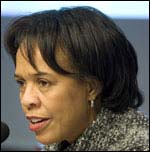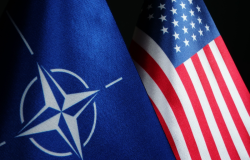Engaging Cuba: Policy Options for the United States, Europe, and the Western Hemisphere
A meeting was held to discuss the divergent perspectives within the international community over how best to engage Cuba.
Overview
Revolutionary Cuba is at once a part of the Latin American community but also apart from it. Largely the result of the U.S. embargo of 1962, this exceptionalism has recently begun to change. To discuss the divergent perspectives within the international community over how best to engage Cuba, the Latin American Program, together with the Heinrich Böll Stiftung Foundation North America and the Caribbean Studies Association, convened a meeting on "Engaging Cuba: Policy Options for the United States, Europe, and the Western Hemisphere."
Director of the Latin American Program Cynthia Arnson outlined a series of questions informing the debate on engaging Cuba. First, to what extent does the transfer of power from Fidel to Raúl Castro mark not only a personnel change at the helm of the regime, but also a substantive change in the goals and policies of the Cuban Revolution? What role should the international community play? Does international engagement itself contribute to change over time, or should it be withheld, pending improvements in human rights and political freedoms?
 Program Coordinator of the Latin America Work Team at the Barcelona Center for International Studies (CIDOB) Anna Ayuso explained the Cuba position of Spain, which is set to take over the E.U. rotating presidency in 2010. Spanish engagement is fraught with conflicting dualities stemming, in part, from Spain's partisan politics. She also recommended that human rights be monitored through multilateral institutions.
Program Coordinator of the Latin America Work Team at the Barcelona Center for International Studies (CIDOB) Anna Ayuso explained the Cuba position of Spain, which is set to take over the E.U. rotating presidency in 2010. Spanish engagement is fraught with conflicting dualities stemming, in part, from Spain's partisan politics. She also recommended that human rights be monitored through multilateral institutions.
If the European Union does not coalesce behind a coherent policy toward Cuba it will risk becoming irrelevant, warned Karl Buck, former head of the Latin America and Caribbean Unit in the General Secretariat of the Council of the European Union. He suggested that the European Union and the United States coordinate better their currently divergent policies.
Discrepancies between the means and ends of E.U. and U.S. policies have rendered both approaches ineffective, argued Stephen Wilkinson, assistant director of the International Institute for the Study of Cuba at London Metropolitan University. U.S. goals involve a complete removal of the current government through international sanctions and isolation, while E.U. goals involve encouraging the government to reform and initiate a peaceful transition through non-coercive engagement.
Director of the U.S. Education Finance Group Ambassador John Maisto suggested that one disaggregate E.U. policy and U.S. policy toward Cuba. For instance, Spain's unilateral policy differs from that of E.U. Common Policy because of the historically intimate Spanish-Cuban relationship. The United States has engaged Cuba differently depending on who is in power; the Obama Administration, for example, has demonstrated a willingness to begin anew with Cuba.
 The question is not whether or not to engage Cuba, argued Bisa Williams, then acting deputy assistant secretary for Western Hemisphere Affairs at the U.S. Department of State; rather, it is how to engage Cuba in a way that effects change and has a positive impact on U.S. national security and the everyday lives of Cubans. This is of particular importance, given the recent upsurge in the harassment of Cuban activists.
The question is not whether or not to engage Cuba, argued Bisa Williams, then acting deputy assistant secretary for Western Hemisphere Affairs at the U.S. Department of State; rather, it is how to engage Cuba in a way that effects change and has a positive impact on U.S. national security and the everyday lives of Cubans. This is of particular importance, given the recent upsurge in the harassment of Cuban activists.
Carlo Dade, executive director at the Canadian Foundation for the Americas (FOCAL) in Ottawa, explained that Canada followed the E.U. approach of engagement for reasons of national identity: its Cuba policy has been a way to distinguish Canada from the United States. If and when U.S. policy changes, Canada would be forced to reappraise its own foreign policy, lest it be sidelined as the global community's relations with Cuba continue to improve.
This shift has been particularly visible in Latin America, explained Jorge Heine, chair in Global Governance at the Balsillie School of International Affairs in Waterloo, Ontario. The region has pushed to normalize relations with Cuba, best seen through the invitation for Cuba to join the Rio Group. Furthermore, Latin America's most influential presidents are sympathetic to a change in U.S. policy.
More important than engaging the Cuban regime is engaging the Cuban people, argued Coordinator for Governance at the International Republic Institute Dan Fisk. Any change in U.S. policy must take into account the welfare of the Cuban people. He cited poll data indicating that only 17 percent of Cubans are satisfied with the direction their country is taking, while 75 percent would vote for fundamental political change, if given the opportunity.
 The international community needs to do more than just engage Cuba; they need to engage with Cuba, added Susanne Gratius, senior researcher of peace, security, and human rights at Madrid's Foundation for International Relations and External Dialogue (FRIDE). She conceded that the real success story behind the Castros' hold on power has been their ability to play international actors off one another. The nascent consensus over constructive engagement will, hopefully, curtail this.
The international community needs to do more than just engage Cuba; they need to engage with Cuba, added Susanne Gratius, senior researcher of peace, security, and human rights at Madrid's Foundation for International Relations and External Dialogue (FRIDE). She conceded that the real success story behind the Castros' hold on power has been their ability to play international actors off one another. The nascent consensus over constructive engagement will, hopefully, curtail this.
Documents & Downloads
- Engaging Cuba: Policy Options for the United States, Europe, and the Western HemisphereDownload
- Engaging Cuba: Policy Options for the United States, Europe, and the Western HemisphereDownload
- Engaging Cuba: Policy Options for the United States, Europe, and the Western HemisphereDownload
- Engaging Cuba: Policy Options for the United States, Europe, and the Western HemisphereDownload
- Engaging Cuba: Policy Options for the United States, Europe, and the Western HemisphereDownload
- Engaging Cuba: Policy Options for the United States, Europe, and the Western HemisphereDownload
- Engaging Cuba: Policy Options for the United States, Europe, and the Western HemisphereDownload
- Engaging Cuba: Policy Options for the United States, Europe, and the Western HemisphereDownload
- Engaging Cuba: Policy Options for the United States, Europe, and the Western HemisphereDownload
Hosted By

Latin America Program
The Wilson Center’s prestigious Latin America Program provides non-partisan expertise to a broad community of decision makers in the United States and Latin America on critical policy issues facing the Hemisphere. The Program provides insightful and actionable research for policymakers, private sector leaders, journalists, and public intellectuals in the United States and Latin America. To bridge the gap between scholarship and policy action, it fosters new inquiry, sponsors high-level public and private meetings among multiple stakeholders, and explores policy options to improve outcomes for citizens throughout the Americas. Drawing on the Wilson Center’s strength as the nation’s key non-partisan policy forum, the Program serves as a trusted source of analysis and a vital point of contact between the worlds of scholarship and action. Read more
Thank you for your interest in this event. Please send any feedback or questions to our Events staff.










